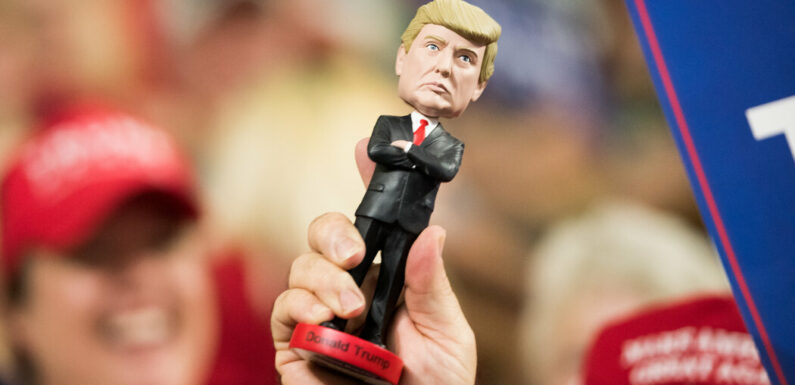
Truth Social, the social network started by former President Donald J. Trump, has struggled to attract large brands.
Among the ads published on Truth Social were ones for bobbleheads depicting Donald J. Trump.Credit…Sean Rayford/Getty Images
Supported by
Send any friend a story
As a subscriber, you have 10 gift articles to give each month. Anyone can read what you share.
By Stuart A. Thompson
Stuart Thompson used a program to collect and analyze hundreds of ads that ran on Truth Social over the past several months.
Between posts about conspiracy theories and right-wing grievances was an unusual advertisement: a photo of former President Donald J. Trump holding a $1,000 bill made of gold, which he was apparently offering free to supporters.
But there were a few catches: The bill was not free, it was not made of gold, and it was not offered by Mr. Trump.
The ad appeared on Truth Social, the right-wing social network started by Mr. Trump in late 2021, one of many pitches from hucksters and fringe marketers dominating the ads on the site.
Ads from major brands are nonexistent on the site. Instead, the ads on Truth Social are for alternative medicine, diet pills, gun accessories and Trump-themed trinkets, according to an analysis of hundreds of ads on the social network by The New York Times.
The ads reflect the difficulty that several far-right platforms, including Rumble and Gab, have faced in courting large brands, preventing the sites from tapping into some of the world’s largest ad budgets. It could be particularly problematic for Truth Social. Although the site has gained influence among the far right, becoming a vibrant ecosystem brimming with activity, its business is in need of cash.
Truth Social raised about $37 million, mainly from Republican political donors, but it is burning through about $1.7 million each month, according to William Wilkinson, a former executive at Trump Media & Technology Group, the social network’s parent company. And two federal investigations have put about $1.3 billion of much-needed funding in jeopardy.
Devin Nunes, the chief executive of Trump Media, said in an announcement last year that the company’s ad strategy would help it “displace the Big Tech platforms” as a major way to reach Americans.
But ad experts say the wariness from prominent brands on far-right social networks, which have positioned themselves as free-speech alternatives to Silicon Valley giants like Meta and Google, is driven by the kinds of conspiracy theories and hyperpartisan politics often found on the sites.
In addition, they say, Truth Social has a relatively small user base and many older users, who are less desirable for the brands. Marketers have complained that Truth Social’s ad-serving technology, run by Rumble, a right-wing video streaming website, offers limited tools for tracking an ad’s performance or for showing ads to users based on their demographic profiles. Those tools, now standard among larger ad networks operated by Google and Meta, are vital for determining an ad’s success.
“The more you stray from that safe center, the more you become the fringe or the extreme on anything, then the less money you’re going to get,” said Tom Denford, the chief executive of ID Comms, an advertising consulting firm.
Truth Social and Trump Media & Technology Group did not respond to requests for comment.
Source: Read Full Article
